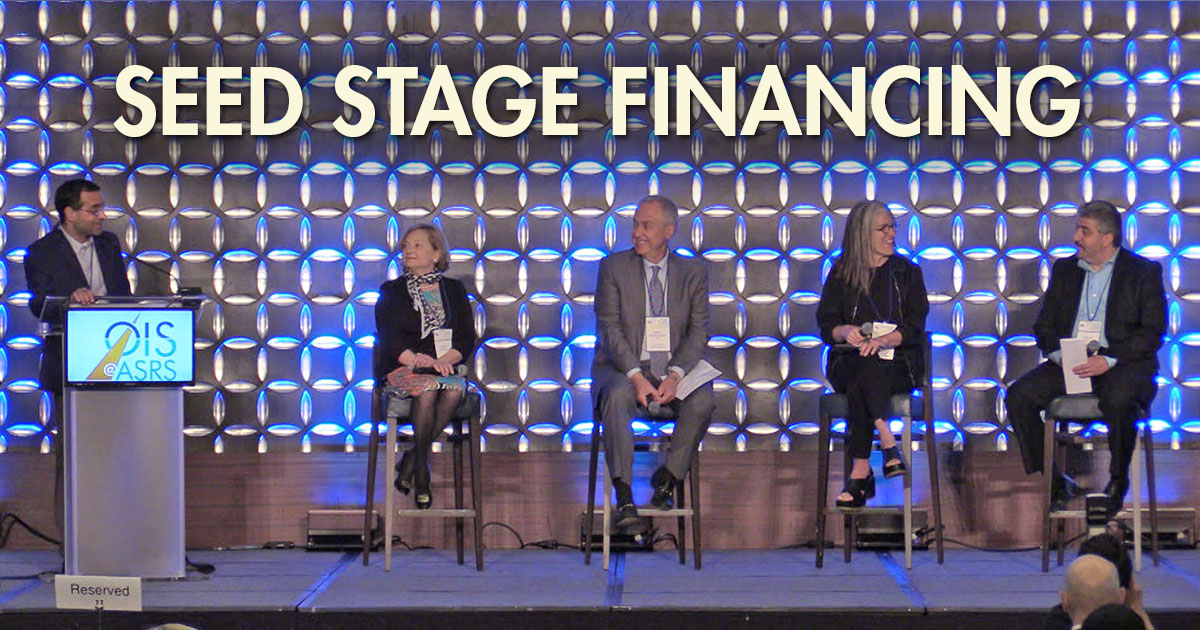Eight Qualities Funders Look for in the Seed Stage

Candor, passion, realism, talent, flexibility, self awareness, humility, and focus are all qualities seed-stage benefactors look for in a start-up founder, a panel of fund managers said at the OIS@ASRS panel on seed-stage financing. Here’s a deeper dive into what they have to say about those key qualities.
Candor
“I think what you’re looking for is candor,” says ForSight Labs president and CEO Angela Macfarlane. “I can promise if anyone comes to ForSight with an idea that you will get a robust discussion and you will get candor about the viability of your idea in our thinking.”
Candor is mandatory so funders and entrepreneurs don’t waste each other’s time. “We can only choose so many things to do, and really being critical – highly critical – and very candid with the entrepreneurs and university groups that have an idea, that’s the commitment we can make,” Macfarlane states. “It’s just very important we don’t bark up the wrong tree for too long because then not only do you not get funded, you really don’t get there.”
Passion
Christy Shaffer, PhD, general partner in Hatteras Venture Partners, looks for passion in the management team. “We often talk to these companies in this very early seed stage for six months to a year or even longer, and we help them develop strategies,” she explains. “What’s important is that they’re listening and that we’re sharing ideas and thoughts and hopefully building on what they initially thought out.”
Realism
Entrepreneurs need to be realistic in setting their goals and expectations, offers Firas M. Rahhal, MD, partner in ExSight Capital. “I know the timing of the milestones and development are often a problem in the early pitch; the management structure, if there is one already, there may be some issues that could be realigned potentially that would make a product more favorable,” he says.
Talent
Having the right people on the team can also boost a start-up’s chances of success, and that’s where the seed stage can help match talent and idea, says Mark S. Blumenkranz, MD, MMS, chairman and managing director of Lagunita Biosciences. “A lot of sophisticated investors feel that you invest in people and not ideas,” he observes. “Assuming that you really do have great technology and it’s your first time, you need to have somebody strong at your side, and that’s where the seed phase can actually help.” Since the market is at an all-time high and a number of exits have been executed, Dr. Blumenkranz says, “There are people out there sort of looking for their next gig, so you can find them.”
Flexibility
Dr. Shaffer has seen good ideas crash and burn because their founders refused to budge. “As you’re forming your idea, you need multiple indications, you need to be willing to hear what others have to say about which ones are more attractive,” she says. “The other places of inflexibility are often with valuation, and there are often comments about ‘Well I don’t want to be diluted at all,’ and that’s virtually impossible.”
Self-Awareness
A keen sense of self-awareness also helps, Dr. Blumenkranz notes. “You have to have an understanding of your strengths and weaknesses as a leader and entrepreneur, and then you have to have a realistic understanding of your technology and what markets you’re proposing to go into,” he says.
He adds, “I’ve never seen a business plan that didn’t say ‘disruptive’ in it, but we know most things aren’t disruptive. Understanding where you’ve got a fundamental disruption, where you’re asking people to think out of the box, and whether you’re just bigger, faster, cheaper – just understanding and being aware of it, because if you’ve got a great team and you’re bigger, faster, cheaper, you can probably get that funded.” For a weak team with a potentially disruptive idea, the risks are higher.
Humility
“I think that the biggest indicator of success that we find in people we hire and ideas we see in early-stage entrepreneurs is a well-rounded sense of humility,” Macfarlane says. “We’re all passionate and competent in some respects, but I think if you lack the humility – which is really speaking to being flexible, speaking to being aware of exactly how valuable or applicable your idea is – too much hubris is the kind of thing that would turn us off.”
Focus
A lack of focus can also doom an idea early on, Dr. Rahhal says, explaining, “Not focus of the asset, but focus of the development plan or the pitch itself, even the slide deck, where there can be sort of a shotgun approach.” Ophthalmology’s allure has drawn in a lot of non-opthalmic entrepreneurs, Dr. Rahhal points out. “For a more sophisticated reader, it sometimes reads as [if the start-up is] just shooting for marketing rather than an actual development plan, and if the entrepreneur and their team could select maybe the single best application, we find that easier to get our hands around and decide due diligence on.”
